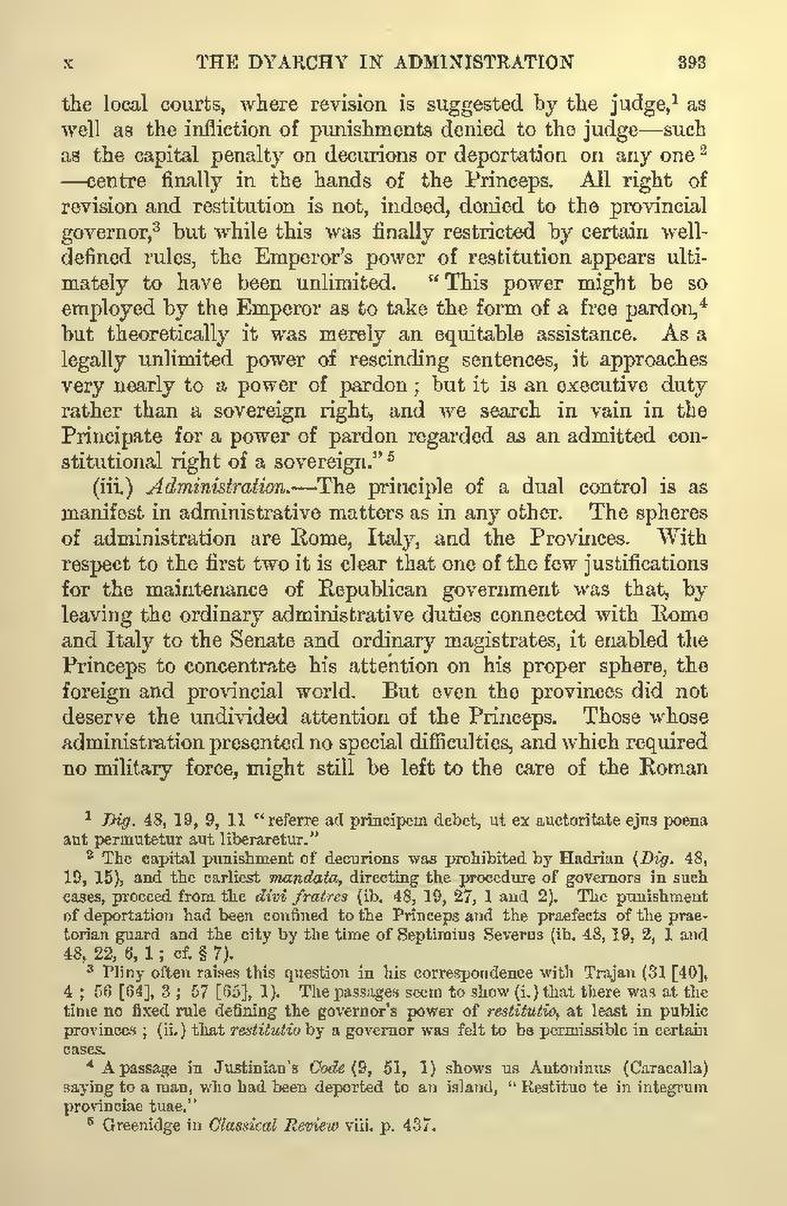the local courts, where revision is suggested by the judge,[1] as well as the infliction of punishments denied to the judge—such as the capital penalty on decurions or deportation on any one[2]—centre finally in the hands of the Princeps. All right of revision and restitution is not, indeed, denied to the provincial governor,[3] but while this was finally restricted by certain well-defined rules, the Emperor's power of restitution appears ultimately to have been unlimited. "This power might be so employed by the Emperor as to take the form of a free pardon,[4] but theoretically it was merely an equitable assistance. As a legally unlimited power of rescinding sentences, it approaches very nearly to a power of pardon; but it is an executive duty rather than a sovereign right, and we search in vain in the Principate for a power of pardon regarded as an admitted constitutional right of a sovereign."[5]
(iii.) Administration.—The principle of a dual control is as manifest in administrative matters as in any other. The spheres of administration are Rome, Italy, and the Provinces. With respect to the first two it is clear that one of the few justifications for the maintenance of Republican government was that, by leaving the ordinary administrative duties connected with Rome and Italy to the Senate and ordinary magistrates, it enabled the Princeps to concentrate his attention on his proper sphere, the foreign and provincial world. But even the provinces did not deserve the undivided attention of the Princeps. Those whose administration presented no special difficulties, and which required no military force, might still be left to the care of the Roman, 4; 56 [64], 3; 57 [65], 1). The passages seem to show (i.) that there was at the time no fixed rule defining the governor's power of restitutio, at least in public provinces; (ii.) that restitutio by a governor was felt to be permissible in certain cases.]
- ↑ Dig. 48, 19, 9, 11 "referre ad principem debet, ut ex auctoritate ejus poena aut permutetur aut liberaretur."
- ↑ The capital punishment of decurions was prohibited by Hadrian (Dig. 48, 19, 15), and the earliest mandata, directing the procedure of governors in such cases, proceed from the divi fratres (ib. 48, 19, 27, 1 and 2). The punishment of deportation had been confined to the Princeps and the praefects of the praetorian guard and the city by the time of Septimius Severus (ib. 48, 19, 2, 1 and 48, 22, 6, 1; cf. § 7).
- ↑ Pliny often raises this question in his correspondence with Trajan (31 [40
- ↑ A passage in Justinian's Code (9, 51, 1) shows us Antoninus (Caracalla) saying to a man, who had been deported to an island, "Restituo te in integrum provinciae tuae."
- ↑ Greenidge in Classical Review viii. p. 437.
